
Concordia Seminary Newsroom
Steady, Inspiring Leadership
Meyer leaves tremendous legacy as the Seminary’s 10th president
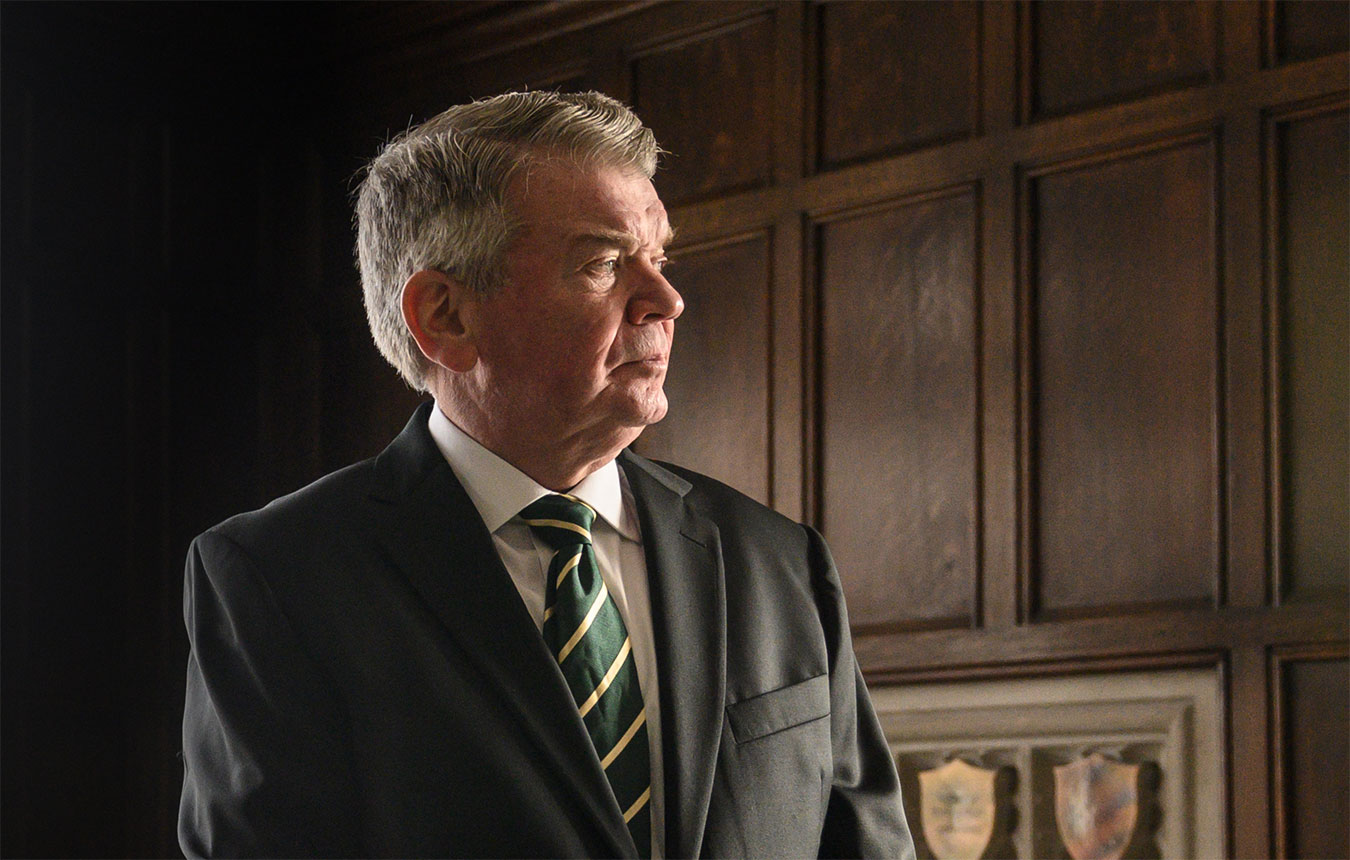
By Kim Plummer Krull and Melanie Ave
Inside his panel-lined office in Pieper Hall, Dr. Dale A. Meyer eyes a miniature wood and metal corpus of Jesus that shows the Savior coming off the cross, a gift when he stepped down as The Lutheran Hour Speaker. He runs his hands over his heavy wooden desk.
But it is a small red book, lying front and center on the spacious desk, that draws his attention. He picks it up and thumbs through the pages. He keeps the well-worn devotional booklet from his 1961 confirmation at St. Paul’s Evangelical Lutheran Church in Chicago Heights, Ill., handy as a reminder of the blessings that have guided his entire life. Holding his “little red book,” Meyer tells seminarians in chapel and campus visitors who come to his office that “the basic, most important things I learned, I learned as a kid from my parents and my church.”
It is those long-ago lessons that have guided his steady and inspiring leadership of Concordia Seminary, St. Louis. On June 30, Meyer will retire as the Seminary’s 10th president after 15 years at the helm. Under his leadership, the Seminary has surmounted financial and cultural challenges, eliminated its debt, quadrupled its endowment, improved its educational programs, expanded its prominence in the Lutheran world, strengthened its funding strategies and improved many of its facilities. As his presidency comes to a close, he is leading the Seminary through a global pandemic, which has meant the transition to online classes for all students, a campus that remains operational but has been closed to visitors and most staff, and virtual-only Call Day and Commencement celebrations. And it has all been toward the Seminary’s ultimate mission of providing shepherds for generations to come.
“Our mission is Jesus’ mission, the Great Commission,” Meyer says. “We do that by the formation of pastors, deaconesses, missionaries and scholars, and sending them into the world. We fulfill Jesus’ mission by providing graduate education and continuing education. People need to know about Jesus. We are providing experts in the field to help lead them to Jesus.”
His legacy on campus and in The Lutheran Church—Missouri Synod (LCMS) will not be forgotten.
‘Didn’t have a clue’
The son of a milkman from Chicago Heights, Meyer always wanted to be a pastor, and as such, had Concordia Seminary in his sights from an early age. He earned a Master of Divinity from the Seminary in 1973, the same year he married Diane. He pastored three Illinois congregations in the 1970s and 1980s including St. Salvator in Venedy, St. Peter in New Memphis and Holy Cross in Collinsville.
Meyer earned a master’s degree in 1974 and a doctorate in 1986 in classical languages from Washington University in St. Louis. He also is the recipient of an honorary Doctor of Divinity from Concordia Theological Seminary in Fort Wayne, Ind. “To me,” he says, “theology is a joyous thing to study.” From 1979 to 1981, Meyer served as a guest instructor at the Seminary and later as an assistant professor and director of Resident Field Education before becoming The Lutheran Hour Speaker in 1989, a position in which he served through 2001. That same year he was named the Seminary’s Gregg H. Benidt Memorial Chair in Homiletics and Literature. In 2004, when Seminary President Dr. John F. Johnson accepted a call to serve as president of Concordia University Chicago, River Forest, Ill., Meyer was named interim president. The following spring, he was elected the Seminary’s 10th president.
“I didn’t have a clue what I was doing,” he says today. “It was really, really tough. I was learning on the job. The Seminary was in transition but it turned out OK.”
Ask anyone else in the Seminary community about Meyer’s 15-year tenure as president — the fourth longest in its 181-year history — and his “OK” sounds like a vast understatement.
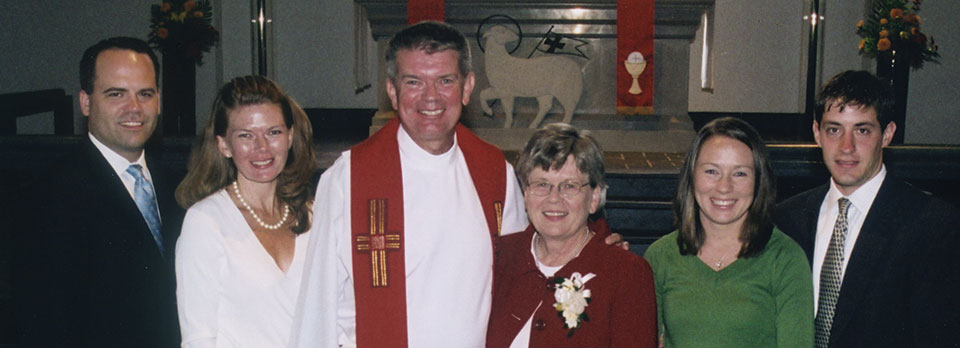
Dr. Dale A. and Diane Meyer, center, with their daughters, Elizabeth, center left, and Catharine, and their husbands, Darren Pittman, left, and Charlie Bailey, right, after Meyer’s installation as Seminary president in 2005. Photo: Courtesy Diane Meyer
Dr. Ralph Blomenberg, former chairman of the Seminary’s Board of Regents, applauds Meyer for keeping a steady hand during the financial crisis of 2008-09 that resulted in a budget reduction of 23% and painful employee layoffs. “He worked to keep the mission the main thing, to advance the Gospel for Jesus,” he says. “He worked collegially for the cause of Christ.”
Michael Louis, the Seminary’s executive vice president and COO, is equally impressed by Meyer’s leadership through tough decisions like the sale of the former Christian Brothers College High School property to Washington University in 2007 and the realignment of Seminary operations after the recession.
“I always think of him as a man who has put his pastor’s heart in check to be a good administrator,” Louis says. “As you look back over the history of his tenure, nothing about his pastor’s heart has diminished. He is more beloved in the church today than he ever has been.”
Preparing church leaders for changing times
Meyer, 73, has been preaching and teaching some 46 years. He’s gained global respect along the way as a leader, scholar, author and pastor. He often says that he wants his children and grandchildren and future great-grandchildren to have the same rich congregational life he had growing up. He is thankful for devoted parents — mother, Norma, and father, Arthur, who died in 1985 — who raised him in church, Sunday school and Lutheran grade school.
From his early days as president, he recognized the need to prepare church leaders to serve in the changing 21st century and in a country dramatically different from the Christian America of his youth. It became one of the main goals of his presidency, to prepare students for ministry in a post-Christian America where church attendance and a Christian background are no longer a given.
Under Meyer’s leadership in 2017, the Seminary debuted its revamped Master of Divinity curriculum — the first major revision since 1958 — to ensure pastoral students develop practical, caring ministry skills that are in touch with today’s times. “It was a huge effort and process,” says former Seminary Provost Dr. Jeff Kloha, who helped steer development of the new curriculum. Kloha credits Meyer with “ensuring input from multiple pastors and congregational leaders for a solid understanding of the needs of the church.”
‘Incredibly personable, pastoral’
Along with providing seminarians a solid theological foundation that is faithful to unchanging Scripture and the Lutheran Confessions, Meyer emphasizes how important it is for seminarians to have strong relational skills or people skills, something he says he learned from his milkman father.
“He’s always inviting students to his house, engaging with them on the campus grounds,” Kloha says. “He wants students to become pastors who know the people in their congregation personally, as individuals … to visit people and participate in everyday life.”
At chapel, students are always talking with “Opa,” the German name for grandpa, used by Meyer’s grandchildren, seminarians and, at times, the president in reference to himself as he offers sage wisdom to students at the end of Call Day services.
“Concordia Seminary is in a better place because of his service and leadership.”
– Rev. Todd Peperkorn
Concluding seminarian Sam Reinhard said Meyer has been one of the most influential people to his faith and his formation as a pastor. “His passion for the church is found in his dedication to the future generation of pastors,” Reinhard says. “He is so selfless that he realizes that the kingdom extends beyond just him. President Meyer is someone who loves deeply and everyone knows it.”
“I honestly can’t think of any other higher education president who hops into a van and rides to Iowa with students,” says Board of Regents Chairman Rev. Todd Peperkorn. But that is exactly what Meyer often does in the winter when he takes a group of future pastors to Mission Central, the LCMS missionary support headquarters in Mapleton, Iowa. “He’s incredibly personable, pastoral and easy to talk to,” Peperkorn says.
Seminary Provost Dr. Douglas L. Rutt points to Meyer’s “big heart for everyone who wants to improve their theological knowledge and skills for ministry. He feels a burden of responsibility to take all the wonderful gifts this Seminary receives from God and make them accessible to the church-at-large and around the world.”
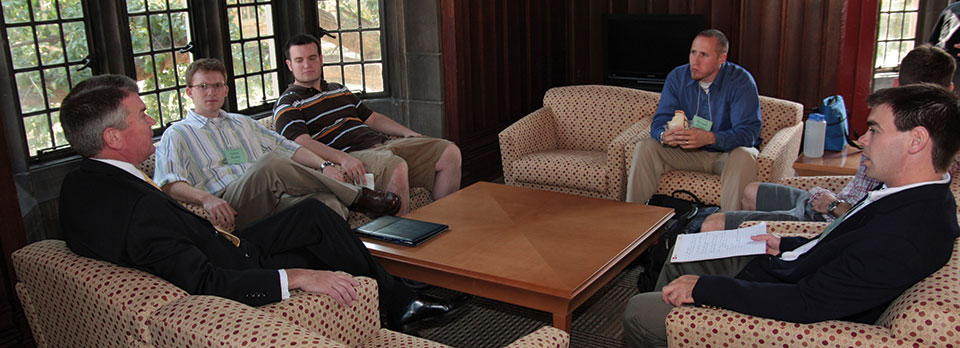
Meyer is well-known for his friendliness and often takes time to visit with faculty, staff, students and campus visitors.
The Seminary sends its professors all over the globe in answer to requests from church bodies seeking solid confessional Lutheran theology and training.
Under Meyer’s watch, confessional Lutheranism has advanced through enhanced partnerships with Lutheran church bodies and seminaries worldwide.
The president calls this “getting out the Lutheran leaven,” or raising awareness of and accessibility to Lutheran theology and the Gospel. “We want our own congregations to grow, but the Great Commission doesn’t simply apply to our church body,” Meyer says. “People may not join our church, but they are joining the Kingdom.”
Friendly, welcoming ambiance
Concordia Seminary has changed a lot since Meyer became president. The president has taken what once was “an ivory tower place,” Kloha says, “to a place intimately connected with congregations and their work in communities around the world.”
Just as professors lead congregation-hosted workshops across the country, pastors and laypeople come to campus for conferences and continuing education opportunities. Meyer tells people the Seminary is about more than just preparing pastors.
“Our mission is Jesus’ mission.”
– Dr. Dale A. Meyer
A friendly, welcoming ambiance flows throughout the 72-acre campus, now a parklike setting with benches for people to sit and talk — students, faculty and staff as well as people from the local Clayton, Mo., community. Meyer encourages the entire campus to greet everyone they meet on campus with a hello.
Soon after Meyer became president, the campus was outfitted with benches and tables and chairs, “symbols that the ministry of the Lord Jesus Christ means being a servant involved with the people,” Meyer says.
Meyer spotlights Diane for sparking the beautifully landscaped transformation. She, too, is a familiar face on campus. Diane has earned “a lot of respect for all the work she’s done, especially for the campus appearance,” Meyer says of his fellow Seminary ambassador.
‘Great time to be at Concordia Seminary!’
Along with championing the formation of pastors and church leaders, the president has raised awareness of the role every member of the body of Christ can play in recruiting seminarians to reverse a troubling shortage of pastors.
Dean of Ministerial Formation Dr. Timothy Saleska says he admires Meyer’s “unfailing optimism,” his awareness of his own sinfulness and his full participation in campus life, such as attending daily chapel services, cheering on the Preachers basketball team and shaving his head as part of the Seminary’s annual St. Baldrick’s Foundation fundraiser for childhood cancer research. “He’s always ready to listen and amazes me with his humble approach to his ministry of leadership,” he says. “His optimism for the Seminary and the church for the spread of the Gospel is very uplifting.”
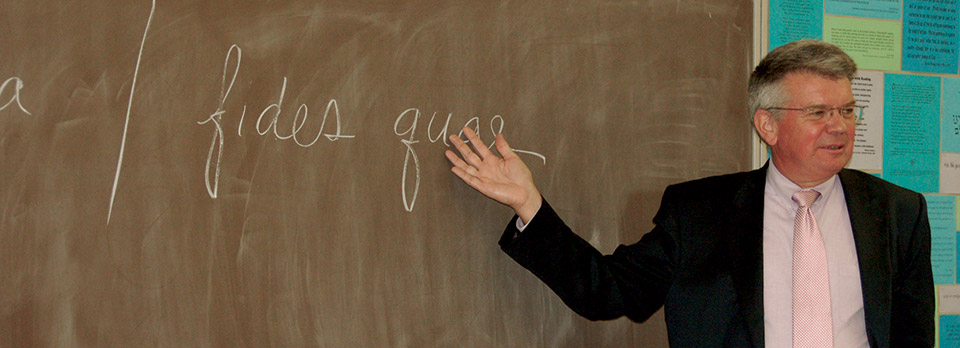
Throughout his presidency, Meyer, also professor of Practical Theology, often taught.
A popular guest preacher in pulpits nationwide, Meyer talks about ministry holes created by years of unanswered calls and a dwindling supply of future pastors. “Will our church body have enough pastors and ministry leaders to share the hope of Jesus Christ with our children and grandchildren with the ever-growing number of people who say they have no faith?” he asks.
Through a major Seminary recruitment initiative, that answer is beginning to look more hopeful.
There is a significant increase this year in student applications. While no guarantee of enrollment, Meyer calls that increase an indication of prospective student interest.
While others bemoan today’s dwindling biblical knowledge and declining worship attendance, the president talks of ample opportunities to share the Gospel. “It’s a great time to be the church!” he says often. “It’s a great time to be at Concordia Seminary!”
Seminarians echo the president’s conviction and say they appreciate the improved affordability of a Seminary education, the result of the school’s stronger financial foundation and what Peperkorn calls Meyer’s management with “holy persistence.” For the past two years, Master of Divinity and Deaconess Studies students have paid zero tuition thanks to faithful donor support. Rather than turn the spotlight his way, Meyer talks about how “people love this church and its Seminary and they love the Gospel message. They’re the reason the Seminary is financially strong and turning a corner on recruitment.”
Meyer is known for his great sense of humor and memory. He knows students, faculty and staff by name. He likes to tease and often has running jokes with students. When new staff are hired, he often stops by to offer a personal welcome and a Bible. “He is a great communicator and excellent storyteller,” says Vicki Biggs, senior vice president of Seminary Advancement and chief communications officer. “He recognizes the importance of sharing the Seminary story so more people have the opportunity to understand and support the Seminary’s mission.”
‘Hard and humbling’
Meyer is leaving the Seminary well-positioned to move forward at a time when many other higher education institutions struggle, Peperkorn says. “Concordia Seminary is in a better place because of his service and leadership,” he says.
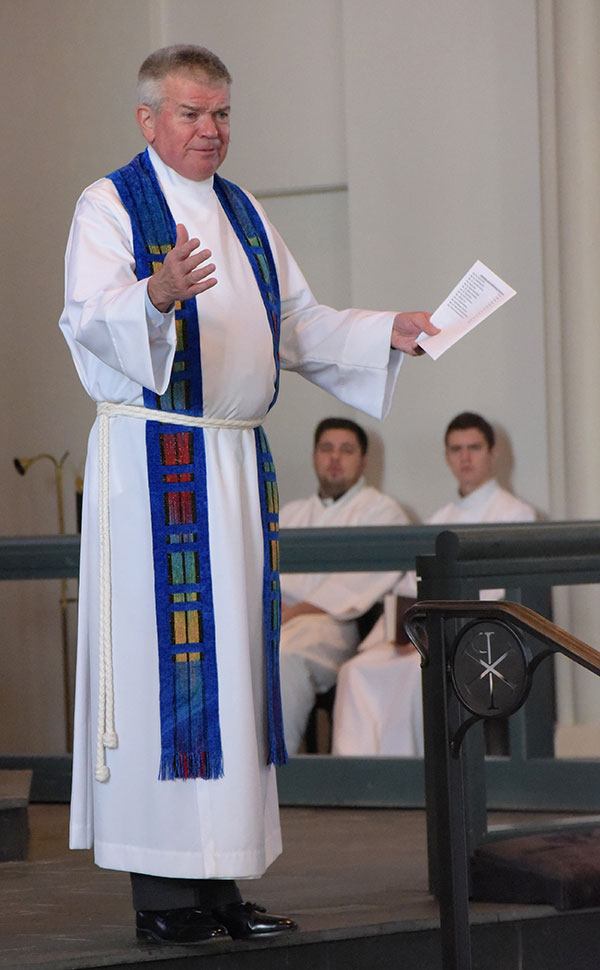
Meyer offers encouragement to faculty and staff celebrating ordination and commissioning anniversaries Dec. 5, 2018. Photo: Mia Mauss
Meyer has no shortage of post-presidency plans. He expects to continue teaching and mentoring seminarians and writing, including a 1 Peter commentary for the Concordia Publishing House scholarly series of books of the Bible. He wants to spend more time with Diane and the couple’s two daughters and their families, especially their five grandsons.
Even though he and Diane are admittedly conflicted about leaving the Seminary they love so dearly, “It’s time for a new generation to take up leadership of this fine institution,” he says. “It’ll be fine because this is not our institution, not our Seminary. This is an institution of the Lord Jesus Christ and it’s His mission.”
At worship on Call Day, set for April 28, his last as Seminary president, Meyer says he may read a bit from the little red book on his desk. He notes that his own personal faith has grown during his presidency as he has realized “you can’t do it all on your own. You need the help of people, the help of God.” The title of his treasured confirmation booklet is aptly titled: Remember.
Kim Plummer Krull is a St. Louis-based freelance writer. Melanie Ave is communications manager at Concordia Seminary, St. Louis.